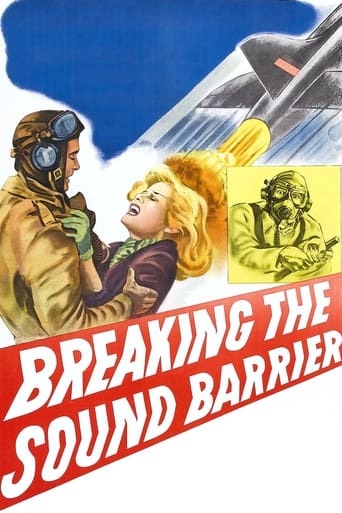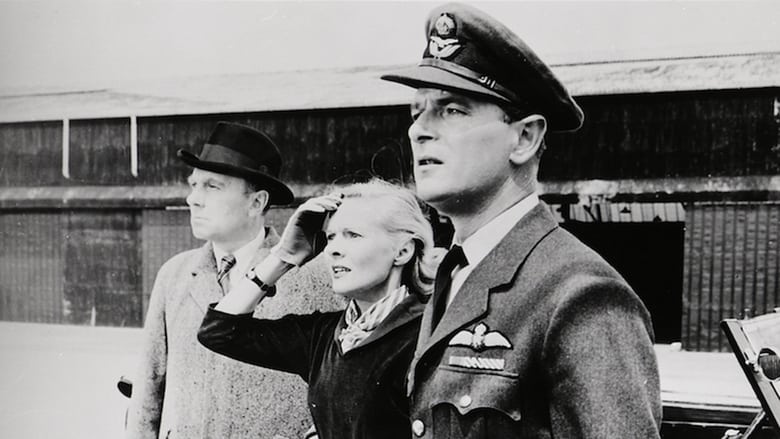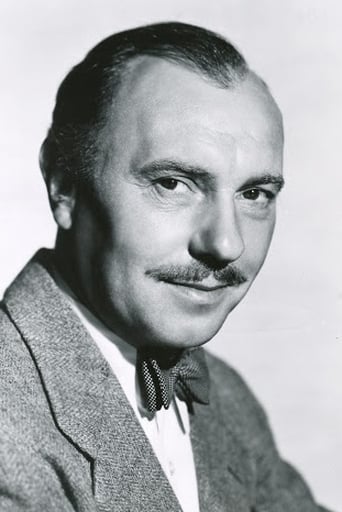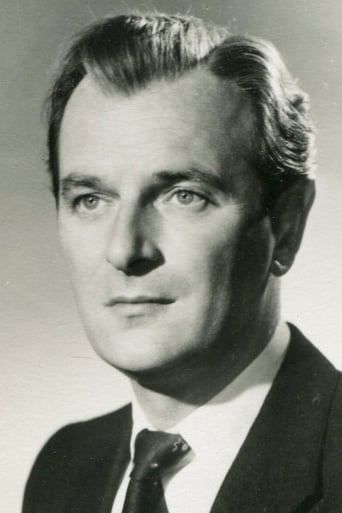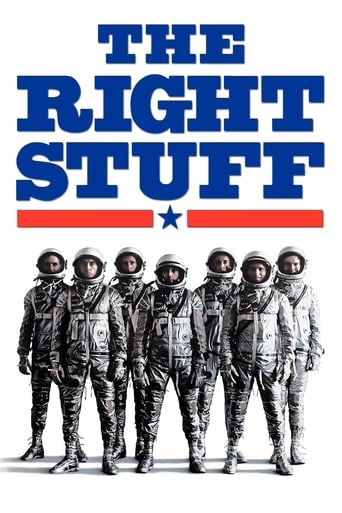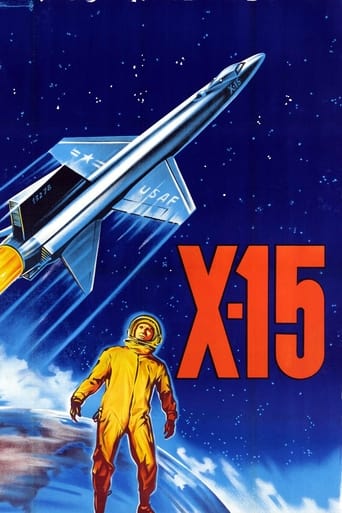The Sound Barrier (1952)
Fictionalized story of British aerospace engineers solving the problem of supersonic flight.
Watch Trailer
Cast
Similar titles
Reviews
Very very predictable, including the post credit scene !!!
It's a good bad... and worth a popcorn matinée. While it's easy to lament what could have been...
Exactly the movie you think it is, but not the movie you want it to be.
This is a dark and sometimes deeply uncomfortable drama
THE SOUND BARRIER attempts to be one of those rousingly British true stories about a team of dedicated men working with science to achieve historical greatness. I'm not too sure about that, but it is directed by David Lean who makes this a nice-looking picture, and it has enough notable actors to make it worth a watch for fans of British cinema.The thrust of the plot seems to be about sacrifice: the lives given up by young men in pursuit of a dream. Said dream is to create an aircraft with the ability to fly fast enough to break the sound barrier. Truth be told I found it all a little long-winded and dull, although the tragic scenes are certainly hard-hitting. One of the best things about it are the assured performances from the likes of Nigel Patrick, Ralph Richardson, and a very youthful Denholm Elliott.
I remember liking this movie as a child on TV on Saturdays, and I wasn't the only one apparently since it won the BAFTA for best picture. Alas, now that I've searched out the DVD and have looked at it as a 21st-century adult, I regretfully conclude that it hasn't held up well at all. There is still some suspense in the test dives. Of course now that we've seen "The Right Stuff" we know that the sound barrier was not broken over the skies of England by some guy working for a company with a management team of one and a design team of one. (Oops, that's your big spoiler right there: a guy actually breaks the sound barrier in the movie.) We have a lot more appreciation for scientific and engineering progress as a team effort, and we are less likely to demand that for dramatic purposes everything be run by some one businessMan like in an old Heinlein story.But that's not my main problem with the movie. For me, the thing that makes it really hard to watch is the "human drama" side which is precisely the thing which I suppose originally made the film particularly "interesting" back in 1952. It brings in the wives. And it brings them in to educate them, or really to mansplain to them. And the message to them is, "Yes, we understand that your cute little female minds would like to keep your husbands alive, and can't fathom why Progress is so Important that your men want to go and give their lives for it. But it really is, so you should just be supportive and smile through your tears and go home and live at Downton Abbey and raise another generation of sons. Or go shopping!"Yes, it really IS just that gender-laden a film from first to last. You think when you see Ann Todd for the first time in uniform during the war that maybe she will be a role model of some kind, but you catch on quick that WWII was an emergency situation, when women were forced to do unnatural things like work in military offices and drive staff jeeps, but as soon as it's won they should go home and be mommies and raise children. ("SONS!") Right, sons. There's of course a whole literature now on postwar anti-feminist reaction in which this film ought to get a mention. Ann Todd's character is later called upon to be the doofus who knows nothing of sound so that men can explain the whole speed of sound business to her. Despite the fact that her father is an aircraft manufacturing magnate, she has never had a conversation with him about air apparently!There are two ways that Test Pilot Wives react, we find; one of them is to mope around like Ann Todd, trying to nag their husbands into letting someone else do the risky stuff and wondering why it's so important to get a plane to go 800 miles an hour. (Of course it's to beat the Russians, but that isn't driven home in the film, so let's just focus on phrases like "It's just got to be done, that's all".) (She might also wonder why her dad doesn't invest in a wind tunnel or find some way to test the properties of the plane other than just send up a guy to dive at the ground and see what happens.) The other way is to be a proto-Stepford airhead like Dinah Sheridan's character, who provides comic relief by bursting in with fabric samples and not giving her husband a second to tell her about his triumph of the day. (Isn't that just like a woman, after all?)I could go on, but it would be tedious and boring. But, you may say, this movie was a product of its reactionary time and place! So true. So, what are our numbers supposed to represent though? Are they meant to sum up Lean's place in cinema heaven, like in Mark Twain's "Captain Stormalong" where people's lives are judged on the basis of what, in the view of omniscience, they did with what they had? My aims are more limited - I'm just saying how much I, today, here (Chicago), liked the movie and why. And it wasn't pleasant.
I noticed that an older review said that this film was not yet available on DVD in the States. Well, at least here in 2011 it is--and Netflix has a copy if you want to see the film.Now comes my typical rant. As an ex-history teacher, I really pay attention to historical accuracy in films. This film, sadly, is a mess historically. The Brits are lovely people--but we Americans (specifically Chuck Yeager) broke the sound barrier. Many other facts are also wrong--see the IMDb trivia section for more on this. Plus, it's sadly ironic that near the end the film seems to sing the praises of the Comet--a plane that soon became known as a deathtrap and was yanked from service because it had the annoying tendency to break apart in mid-air! HOWEVER, since the film was made by David Lean and features lovely actors such as Ralph Richardson, Ann Todd and Denholm Elliot, then it STILL is worth seeing despite its many deficiencies. Certainly NOT a must-see--but a decent fictional film.
BREAKING THE SOUND BARRIER is the U.S. title for this film which I missed seeing when originally released. It was a pleasure seeing it for the first time tonight on TCM. RALPH RICHARDSON once again plays a father who was emotionally distant from his son (DENHOLM ELLIOT) and daughter (ANN TODD) and shows more concern for the progress of scientific investigation in solving the problem of supersonic flight than the welfare of individuals who sacrifice their lives to please him. He shows more constraint here as the father than he did in THE HEIRESS a few years previous.Under David Lean's direction, the film moves briskly through a series of events involved in breaking the sound barrier through jet propulsion at a time when the aircraft industry was making great strides after WWII.While the characters are fictional, so are the events depicted, since a British airman was not the first to break the sound barrier--something that American pilot Chuck Yaeger was quick to point out when he was invited to attend the world premiere of the film in London. It was broken by an American pilot as early as 1947.Tension between Richardson and his children helps make the fictional story more compelling and the acting by RALPH RICHARDSON, NIGEL PATRICK (as Ann Todd's pilot husband) and ANN TODD is excellent.Summing up: Interesting from many viewpoints despite being a bit too talky with a good background score from Malcolm Arnold.
